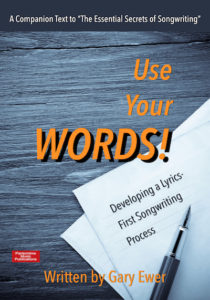You should assume that with every song you write, some will love it and some won’t. What you hope for is that the vast majority will be in the righthand side of that bell curve, where most people will either like or love it, and hopefully a small minority will dislike or hate it.
And that’s called normal. It’s unrealistic to assume that everyone will love your songs. You will always have people who dislike what you’ve written, people who find that it doesn’t happen to resonate on any level with them. And in fact, they might hate it.
And again I’ll say, that’s normal.
That, by the way, is why it can be a bit of a useless exercise to go on public forums and ask people if they like your latest song. Assuming the world is behaving normally, some will say they like it, and some will say they won’t. So you haven’t really learned anything.
 The best songwriters are best because of the power of the words they use. Read “Use Your Words! Developing a Lyrics-First Songwriting Process” in order to become a better lyricist. Right now it’s a FREE add-on to “The Essential Secrets of Songwriting 10-eBook Bundle”
The best songwriters are best because of the power of the words they use. Read “Use Your Words! Developing a Lyrics-First Songwriting Process” in order to become a better lyricist. Right now it’s a FREE add-on to “The Essential Secrets of Songwriting 10-eBook Bundle”
The most important person to please is yourself: Do YOU like what you’ve written? That’s all that really matters. If you like your song, that probably means you’ve largely adhered to some basic principles of good songwriting.
What If You Can’t Tell?
Have you ever had this circumstance: Sometimes you can’t tell? You listen to your own song, and you start to worry that because you’re so familiar with it, you can’t tell if it’s actually any good. The song becomes like a pair of warm mittens you’ve had for years: you like them so much that you don’t even notice the holes anymore.
The best songwriters have developed an ability to listen objectively, which is to disassociate themselves from the creation of the song, and listen to it as if it were written by someone else.
The best way to develop that aspect of objectivity is to:
- Record your song, even in some sort of bare-bones kind of version.
- Put your song away for a couple of weeks.
- Take your recording out and listen to it in its entirety.
Interviewing Yourself
That space of time offers you your best chance to hear your song from a less passionate point of view. And once you’ve listened again, conduct a little interview with yourself as if Rolling Stone magazine showed up at your door, and ask yourself some key questions:
- What songwriting process did you use when writing this song?
- What’s your favourite part of the song?
- What do you think is the best line of lyric?
- What are you hoping people discover about you, or about the way you think?
- Does this song depart in any significant way from songs you’ve written in the past? How?
There are probably many other questions you could ask yourself, and hopefully you get the point. If you find that there are questions that you can’t answer, you’ve got to assume that listeners won’t know the answer either, and that’s not usually a good thing.
Objectivity and confidence are vital parts of songwriting success. If you lack either, your ability to advance as a songwriter will be limited.
By the way, if you do feel that you need to ask someone if they like your song, that question is always best answered by someone whose musicianship you trust — a fellow songwriter, a good performer — someone with musical experience. That’s because they’re the ones who can actually give you an opinion based on years of valuable experience.
 Written by Gary Ewer. Follow Gary on Twitter.
Written by Gary Ewer. Follow Gary on Twitter.
 Get “The Essential Secrets of Songwriting” eBooks. They’ll help you polish your technique, and make you the best songwriter you can be. Comes with a Study Guide, tons of chord progressions, and information covering every aspect of how to write good music.
Get “The Essential Secrets of Songwriting” eBooks. They’ll help you polish your technique, and make you the best songwriter you can be. Comes with a Study Guide, tons of chord progressions, and information covering every aspect of how to write good music.











Gary, Please show us some examples of songs you have written. Your advice is spot on from the technical side but without hearing your actual compositions I can not develop enough faith in your teachings to make me want to purchase any of your courses. The style of music does not matter as long as your songs are moving, entertaining, or enlightening. I am rooting for you to actually be a good songwriter I can have confidence in.
Hi Steve:
I answer this question a lot. I sometimes think it’d be best to write a blog article dealing with it, but I think I’d still answer it! 🙂
The vast majority of the music I write is commissioned by choirs and other vocal ensembles. I also write for symphony orchestra, particularly as pertains to my work with Symphony Nova Scotia. These pieces are usually meant for live performance, and because they are commissions, I don’t usually pursue recording them. That’s up to whoever purchases the composition/arrangement.
You can see samples of my music at my website “Pantomime Music Publications.” But they are all in written form, as that’s what the commissioning group usually needs.
Most of the people/groups I write for do live performances, rarely recordings. Once in a while they record music I’ve written, like this recording of my arrangement of the folk song “Grand River”, recorded by Halifax Camerata Singers. Sometimes someone will capture a live performance of something I’ve composed, like this children’s piece I wrote called “Let’s Sing Together.”
But whether they record it or not is really up to them – I write music, I don’t spend a lot of time worrying about whether I should record it or not.
Beyond that, I don’t know how to allay your fears that I might not know what I’m doing. You definitely should not be buying anything from me or anyone if you lack confidence in the ideas being expressed. But it may be a little like telling your local car mechanic that you lack confidence in his ability to fix your car until you see a car that he’s built.
I hope this all helps, Steve.
-Gary
Gary. Thanks for your reply. I’ve learned a lot about music theory and progressions from your posts and I greatly appreciate your presence on the internet. When it comes to the more undefinable aspects of songwriting, like lyrics and melody, I feel experience is the true teacher. For example, raising the pitch and energy level for the chorus should be instinctive. Using techniques like slant rhymes should come naturally after writing a few songs. Making a song interesting is largely dependent on how interesting you are as a person (or how willing you are to read and think and explore). My own best advice to fledgling writers is to write 30 or so songs and be happy if 4 or 5 of them come out decent; by the time you get to 50 you can expect maybe half to be good and 1 or 2 to be classics. And I rarely take my car to the mechanic because I’ve learned how to do most common repairs myself.